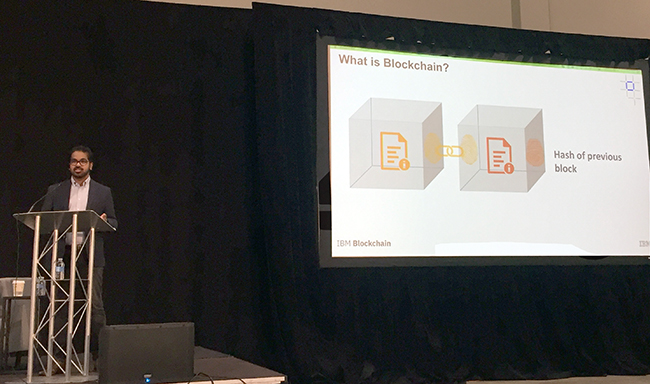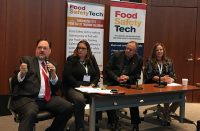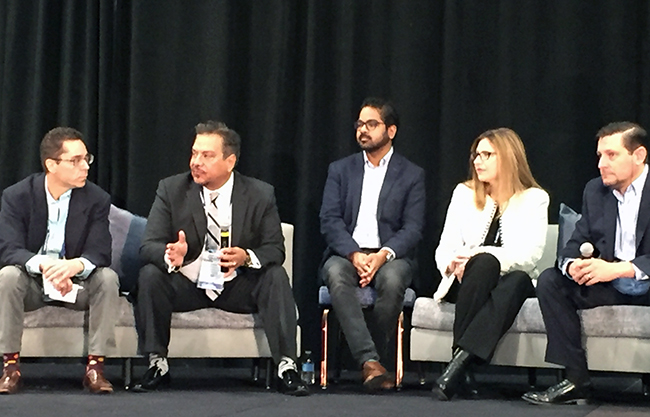The jury is still out on how (and if) blockchain can contribute to a safer food supply. Whether or not there is a clear understanding of the technology, and its potential and pitfalls, is up for debate as well. “What is blockchain? This is the number one question that people have,” said Darin Detwiler, director, regulatory affairs of food and food industry at Northeastern University, who led a panel of experts as they deliberated over this hot topic during the 2018 Food Safety Consortium.
“Blockchain levels the playing field where we can connect people, resources and organizations in ways we’ve never done before to harness new ways of extracting value,” said Nigel Gopie, global marketing leader, IBM Food Trust at IBM.
What Is Blockchain?
Gopie provided an introductory definition of blockchain: Simply put, it is a series of blocks of information attached together. Each block is a box of information that stores data elements, and this data could be almost anything. Each block has a digital fingerprint associated with it; this fingerprint allows you to know that the block is unique and can attach to other blocks. When new blocks come into the chain, each block has a new fingerprint—one that is unique to that block and of the block before it. This allows the connection to happen, and enables visibility into the origin of each block.
Blockchain enables one book of business and provides three important benefits, said Gopie:
- Digital transactions
- Distributed ledger with one version of truth throughout the network
- Data is immutable

Although blockchain can help to start the process of solving food issues surrounding safety, freshness, reduced waste and sustainability, the technology is only the foundation. A series of other components are important as well, said Gopie, and the following are some insights that the expert panel shared during their discussion.

Can Blockchain Actually Impact Food Safety?
Jorge Hernandez, chief food safety officer at Wholesome International: “To me, it’s a fantastic new technology that would allow the food industry to do a much better job of finding, from seed to fork, all of the processes and things that happen to that product. And in the future, [it] allows us to identify problems first and solve [them]. My problem is it being sold to companies…and not able to deliver on the promise… It bothers me that we are looking at a future that may or may not be there.”
Angela Fernandez, vice president, retail grocery & foodservice at GS1 US: “We’ve been working on traceability and transparency for over a decade—you have to be capturing the data needed, [and] we’re still working on getting it right. We’re just not there yet. I think it’s a great place for us to strive to go towards, but we’re still early in the stages of accepting it as a community.”
David Howard, vice president of corporate strategy at Pavocoin: “Blockchain itself is simply a technology. We’re all here because we’re just trying figure out what application we can use in business. Blockchain is a technology that can help all of you improve operational efficiencies for your bottom line.”
Is Blockchain a Barrier or a Fast Lane to Heightened Liability Concerns?
Shawn Stevens, food industry lawyer and founder of Food Industry Counsel, LLC: “I think the starting point is to ask ourselves what makes food unsafe. It’s a lack of transparency…What blockchain can do is illuminate entire segments of the industry…From a reactive standpoint, blockchain can help us identify a problem [and] solve it. From a preventive standpoint, if I have access to all this information regarding attributes and quality of supplier, I can make better decisions that protect my company.”
“We want to know more and be better informed. Once you know more, you better react and do something. If you’re getting this line of sight and you don’t react to it, that’s what exposes you to liability.”
Darin Detwiler, director, regulatory affairs of food and food industry at Northeastern University: “We need to look at the balance between the reactive use of blockchain and the proactive use.”

What Barriers Does Industry Need to Anticipate?
Fernandez: “The barrier of the standards and interoperability piece—that’s a big question our community is asking us. Scalability… standards are vital…I think that opens up a different discussion when talking about private versus public blockchain.”
Hernandez: “What is my ROI? The issue I have with blockchain is not only the investment in my organization, but I have to bring my entire supply chain with me if I want to get any benefit. There’s a good value proposition, but it requires you to get everyone on board. When you’re a large organization, it’s probably not that hard to do. But a small organization like mine where my suppliers are an Amish community that sells us cheese, that’s a huge mountain to climb. They don’t have the background [or] the technology, and even if they wanted to do it, it’s a big change for them. You’re asking me to make a change in my relationship with my suppliers.”
“Take a look at it from the business continuity [perspective]. What are the changes you’re going to have to make? And that changes that have to be made by everyone who works with you? We should not stay static. We should continue to look for things. If this is the technology that is going to move us forward, let’s start getting prepared.”



